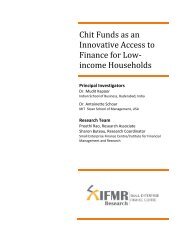Government of India Volume I: Analysis and Recommendations
Government of India Volume I: Analysis and Recommendations
Government of India Volume I: Analysis and Recommendations
Create successful ePaper yourself
Turn your PDF publications into a flip-book with our unique Google optimized e-Paper software.
Table <strong>of</strong> <strong>Recommendations</strong> 13.5 Finality <strong>of</strong> settlements<br />
FOUNDATIONS OF CONTRACTS AND PROPERTY<br />
The Commission recommends the creation <strong>of</strong> an exception to normal priority <strong>of</strong> claims in the following instance:<br />
When a trading member <strong>of</strong> a clearing house is declared as insolvent or bankrupt, the transactions <strong>and</strong> obligations <strong>of</strong><br />
the member will be outside the jurisdiction <strong>of</strong> any liquidator or receiver. The claims <strong>of</strong> the clearing house over assets<br />
earmarked for settlement <strong>of</strong> claims will be the property <strong>of</strong> such clearing house till the claims are settled <strong>and</strong> cannot<br />
form part <strong>of</strong> the liquidation process.<br />
Table <strong>of</strong> <strong>Recommendations</strong> 13.6 Finality <strong>of</strong> transactions<br />
The Commission recommends:<br />
1. An Infrastructure Institution which does netting <strong>and</strong> settlements should operate on rules which are approved<br />
by the regulator;<br />
2. The final set <strong>of</strong> transactions created by the Infrastructure Institution would be enforceable in law <strong>and</strong> would<br />
be recognised as a settlement for all the trades carried out;<br />
3. The Infrastructure Institution would be allowed to replace contractual obligations between trading parties<br />
with the obligations arising out <strong>of</strong> settlement system; <strong>and</strong><br />
4. Even in the event <strong>of</strong> a bankruptcy <strong>of</strong> a person all the collateral <strong>of</strong> the person which have been deposited to<br />
the Infrastructure Institution must be outside the jurisdiction <strong>of</strong> a receiver or liquidator. The collateral should<br />
be used to complete the transactions already initiated on the Infrastructure Institution <strong>and</strong> then any surplus<br />
may be garnered by the liquidator.<br />
13.5.3. Finality <strong>of</strong> financial transactions<br />
The Commission noted that transactions on an Infrastructure Institution cannot be easily<br />
undone. In netting <strong>and</strong> settling systems, if any individual transaction is undone, all dependant<br />
transactions will also have to be undone. This would create uncertainty for all<br />
persons using such institutions. Problems could also arise on exchanges where trades<br />
are executed at one point <strong>of</strong> time but the exchange <strong>of</strong> securities <strong>and</strong> money happens at a<br />
later point <strong>of</strong> time. If a person refuses to uphold the trade or goes bankrupt after making<br />
a trade but before completing it, a transaction may fail. Failure <strong>of</strong> a transaction in the<br />
exchange may have domino effect on other transactions.<br />
The Commission is <strong>of</strong> the view that transactions on an Infrastructure Institution should<br />
be final <strong>and</strong> not undone under any circumstances. <strong>Recommendations</strong> <strong>of</strong> the Commission<br />
in relation to finality <strong>of</strong> transactions are given in Table 13.6.<br />
13.6. Public issue <strong>and</strong> trade <strong>of</strong> securities<br />
The Commission found that the public issue <strong>and</strong> trade <strong>of</strong> securities have three important<br />
regulatory objectives:<br />
1. The public issue <strong>of</strong> securities should be done in a manner that adequate information about the<br />
issuer <strong>and</strong> the security is available (on a continuous basis) to the public to make informed decisions<br />
about investments.<br />
2. The entity issuing the securities must have governance system which ensures that the issuer<br />
treats all purchasers <strong>of</strong> a specific class <strong>of</strong> securities in the same way <strong>and</strong> prevent illegitimate<br />
transfer <strong>of</strong> any funds from the issuer.<br />
3. The trade <strong>of</strong> securities require that the rules governing the trading <strong>of</strong> different securities have<br />
common underlying principles which should apply to all trading <strong>of</strong> securities. These are required<br />
to prevent regulatory arbitrage between trading different securities <strong>and</strong> should be based on mitigating<br />
<strong>and</strong> managing the risk <strong>of</strong> transactions.<br />
13.6.1. Public issue <strong>of</strong> securities<br />
An incorporated or unincorporated entity may pool capital from an investor base by issuing<br />
securities. While doing so, the investor relies on the ability <strong>of</strong> the entity’s manage-<br />
126 FINANCIAL SECTOR LEGISLATIVE REFORMS COMMISSION



